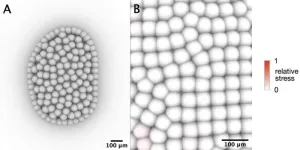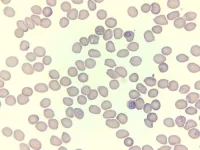(Press-News.org) Lead exposure is a risk to any human, but children are most vulnerable to the element’s neurotoxicity, which can lead to developmental delays, learning difficulties and mood changes among other symptoms. There has been some progress in reducing exposure and preventing neurotoxicity, but hundreds of thousands of American children are still affected.
A new study by Thomas Jefferson University neuroscientist Jay Schneider, PhD, suggests that the toxic effects of lead can be mitigated by attentive maternal care and an enriched environment in an animal model.
Dr. Schneider had previously shown that rats living in an enriched environment – larger cages with toys and climbing structures – experienced fewer negative effects on cognitive function and brain chemistry caused by lead exposure. In the new work, infant rats exposed to lead received either low- or high-quality maternal care, as measured by the amount of licking, grooming and nursing the pups received. After weaning, the rats lived in either standard laboratory cages or enriched environments. They found that high quality maternal care, along with an enriched environment, reduced lead’s untoward effects on performance on a memory task.
Animal studies like this are important as they demonstrate that the neurotoxic effects from early life lead exposure can be modified under appropriately enriched conditions — that the effects may be persistent but are not necessarily permanent. “It provides hope for families with lead-poisoned children,” Dr. Schneider says, "and particularly for families of lower socioeconomic status, where a child’s environment may also be less enriching.”
Primary prevention to avoid exposure in the first place is the best strategy, but until that is achieved, it’s crucial to understand that behavioral and environmental interventions might have positive impacts. “Lead poisoning has an enormous societal cost,” Dr. Schneider says. “My hope is that this study and others like it will be a call to action.”
By Jill Adams
END
Mitigating the neurotoxic effects of lead exposure
The behavioral effects of lead exposure in animals can be modified by an enriching environment and attentive maternal care.
2024-10-28
ELSE PRESS RELEASES FROM THIS DATE:
Developing kidneys from scratch
2024-10-28
To Alex Hughes, Assistant Professor in Bioengineering within Penn Engineering and in Cell and Developmental Biology within Penn Medicine, the kidney is a work of art. “I find the development of the kidney to be a really beautiful process,” says Hughes.
Most people only ever see the organ in cross-section, through textbooks or by dissecting animal kidneys in high school biology class: a bean-shaped slice with lots of tiny tubes. “I think that really undersells how amazing the structure is,” says ...
Airbnbs associated with more crime in London, new study shows
2024-10-28
Since its founding in 2008, the short-term homestay platform Airbnb has expanded to 100,000 cities in more than 220 countries, and, according to data from the company, 1.5 billion guests had stayed in Airbnb-listed properties through 2023.
Much of the academic research on Airbnb activity comes from economics and business literature and focuses on housing-supply impacts, says David Kirk, professor of criminology at the University of Pennsylvania. Yet research on neighborhood impacts is limited, and that research neglects the impacts of Airbnb activity on measures of community cohesion and safety.
Kirk teamed with University of Cambridge criminologist ...
New study finds invasive plants drive homogenization of soil microbial communities across U.S.
2024-10-28
Invasive plants are doing more than just taking over landscapes — they’re also changing the soil beneath them. A new study co-authored by Matthew McCary, assistant professor of biosciences at Rice University, reveals that these species are reshaping soil microbial communities across the U.S., making them more uniform and altering how ecosystems function. The findings, published in Proceedings of the National Academy of Sciences on Oct. 24, shed light on the far-reaching impacts of invasive plants, which extend beyond what we see above ground.
The ...
Researchers’ new outreach strategy succeeds, sets blueprint for detecting invasive species in Florida
2024-10-28
Invasive species in Florida like Nile monitors and Argentine black-and-white tegus pose a growing threat to the Sunshine State’s environment, economy and public safety. South Florida’s warm climate, disturbed habitats and bustling pet trade have made it a hotspot for these non-native, cryptic reptiles. However, finding these elusive creatures has always been a challenge – until now.
University of Florida researchers are showcasing how a focused outreach initiative in Palm Beach County has led to a successful increase in reports of invasive reptiles in Florida. The findings are documented in the latest study published in Scientific Reports and authored by researchers at UF/IFAS ...
Discovery of critical iron-transport protein in malaria parasites could lead to faster-acting medications
2024-10-28
Malaria kills over 600,000 people a year, and as the climate warms, the potential range of the disease is growing. While some drugs can effectively prevent and treat malaria, resistance to those drugs is also on the rise.
New research from University of Utah Health has identified a promising target for new antimalarial drugs: a protein called DMT1, which allows single-celled malaria parasites to use iron, which is critical for parasites to survive and reproduce.
The results suggest that medications that block DMT1 might be very effective against malaria.
The new results are published in PNAS.
An ironic mystery
Paul Sigala, ...
Risky choices: How US laws affect migrant children’s journeys to border
2024-10-28
U.S. immigration law and the legal categorizations it imposes on migrants shape the journeys of migrant children from Central America as they move through Mexico toward the southern U.S. border, according to a new Yale study.
In the study, sociologist Ángel Escamilla García documents the various hard decisions Central American youth are forced to make during their journeys to maximize their chances of not being deported once they reach the United States. Those choices include concealing sexual assaults, beatings, and other crimes ...
Scientists address risks to supply chain in a connected world
2024-10-28
RICHLAND, Wash.—Scientists are gathering at the Department of Energy’s Pacific Northwest National Laboratory this week for a first-ever conference to consider ways to protect critical systems such as our electrical grid, water treatment plants and financial networks that are vulnerable in new ways.
The Cyber Supply Chain Risk Management Conference, known as CySCRM 2024, is being held on the PNNL campus Tuesday-Wednesday, Oct. 29-30.
It’s a new kind of science meeting, one that scientist Jess Smith and colleagues felt compelled to create as they eye a new kind of risk—a ...
Don’t skip colonoscopy for new blood-based colon cancer screening, study concludes
2024-10-28
Newly available blood tests to screen for colorectal cancer sound far more appealing than a standard colonoscopy. Instead of clearing your bowels and undergoing an invasive procedure, the tests require only a simple blood draw. But are the tests effective?
A study led by researchers at Stanford Medicine concluded that the new tests are ideal for people who shy away from other colorectal cancer screening. However, if too many people who would have undergone colonoscopies or stool-based tests switch to the blood tests, colorectal cancer death rates will rise. Because the more established colonoscopies and stool tests ...
Up to half of Medicare beneficiaries lack financial resources to pay for a single hospital stay
2024-10-28
Embargoed for release until 5:00 p.m. ET on Monday 28 October 2024
@Annalsofim
Below please find summaries of new articles that will be published in the next issue of Annals of Internal Medicine. The summaries are not intended to substitute for the full articles as a source of information. This information is under strict embargo and by taking it into possession, media representatives are committing to the terms of the embargo not only on their own behalf, but also on behalf of the organization they represent. ...
Chemicals produced by fires show potential to raise cancer risk
2024-10-28
Derek Urwin has a special stake in his work as a cancer control researcher. After undergraduate studies in applied mathematics at UCLA, he became a firefighter. His inspiration to launch a second career as a scientist was the loss of his brother, Isaac, who died of leukemia at only 33 despite no history of cancer in their family. Working with Anastassia Alexandrova, a professor of chemistry and biochemistry in the UCLA College, he earned his doctorate.
Urwin is now a UCLA adjunct professor of chemistry — and still a full-time firefighter with the Los Angeles County Fire Department. In a recent publication, his science shed new light on the chemical underpinnings of exposures ...
LAST 30 PRESS RELEASES:
Machine learning tool can predict serious transplant complications months earlier
Prevalence of over-the-counter and prescription medication use in the US
US child mental health care need, unmet needs, and difficulty accessing services
Incidental rotator cuff abnormalities on magnetic resonance imaging
Sensing local fibers in pancreatic tumors, cancer cells ‘choose’ to either grow or tolerate treatment
Barriers to mental health care leave many children behind, new data cautions
Cancer and inflammation: immunologic interplay, translational advances, and clinical strategies
Bioactive polyphenolic compounds and in vitro anti-degenerative property-based pharmacological propensities of some promising germplasms of Amaranthus hypochondriacus L.
AI-powered companionship: PolyU interfaculty scholar harnesses music and empathetic speech in robots to combat loneliness
Antarctica sits above Earth’s strongest “gravity hole.” Now we know how it got that way
Haircare products made with botanicals protects strands, adds shine
Enhanced pulmonary nodule detection and classification using artificial intelligence on LIDC-IDRI data
Using NBA, study finds that pay differences among top performers can erode cooperation
Korea University, Stanford University, and IESGA launch Water Sustainability Index to combat ESG greenwashing
Molecular glue discovery: large scale instead of lucky strike
Insulin resistance predictor highlights cancer connection
Explaining next-generation solar cells
Slippery ions create a smoother path to blue energy
Magnetic resonance imaging opens the door to better treatments for underdiagnosed atypical Parkinsonisms
National poll finds gaps in community preparedness for teen cardiac emergencies
One strategy to block both drug-resistant bacteria and influenza: new broad-spectrum infection prevention approach validated
Survey: 3 in 4 skip physical therapy homework, stunting progress
College students who spend hours on social media are more likely to be lonely – national US study
Evidence behind intermittent fasting for weight loss fails to match hype
How AI tools like DeepSeek are transforming emotional and mental health care of Chinese youth
Study finds link between sugary drinks and anxiety in young people
Scientists show how to predict world’s deadly scorpion hotspots
ASU researchers to lead AAAS panel on water insecurity in the United States
ASU professor Anne Stone to present at AAAS Conference in Phoenix on ancient origins of modern disease
Proposals for exploring viruses and skin as the next experimental quantum frontiers share US$30,000 science award
[Press-News.org] Mitigating the neurotoxic effects of lead exposureThe behavioral effects of lead exposure in animals can be modified by an enriching environment and attentive maternal care.




